Screen time has long been a hot topic for parents. Many think that parenting has gotten harder over the years, with technology being a key reason why. Between the rise of AI, the staying power of platforms like YouTube, and the ubiquity of screens, parents face a wide range of choices about kids’ tech use.
We asked parents what their child age 12 or younger uses and how they feel about it. We found:
- Kids’ tech use comes in many forms: Tablets, smartphones and especially TV are common. Sizable shares of parents, even those with the youngest kids, say their child ever uses these.
- AI is part of the mix for some kids: About one-in-ten parents with a child age 5 to 12 say their kid uses AI chatbots.
- YouTube is widely used: 85% of parents say their child watches YouTube, including 51% who say that’s daily use. More parents say their kids under 2 watch YouTube today than in 2020.
We also dive into reasons behind use, trade-offs of technology and the question of whether kids are spending too much time on screens below.
What kinds of tech kids are using
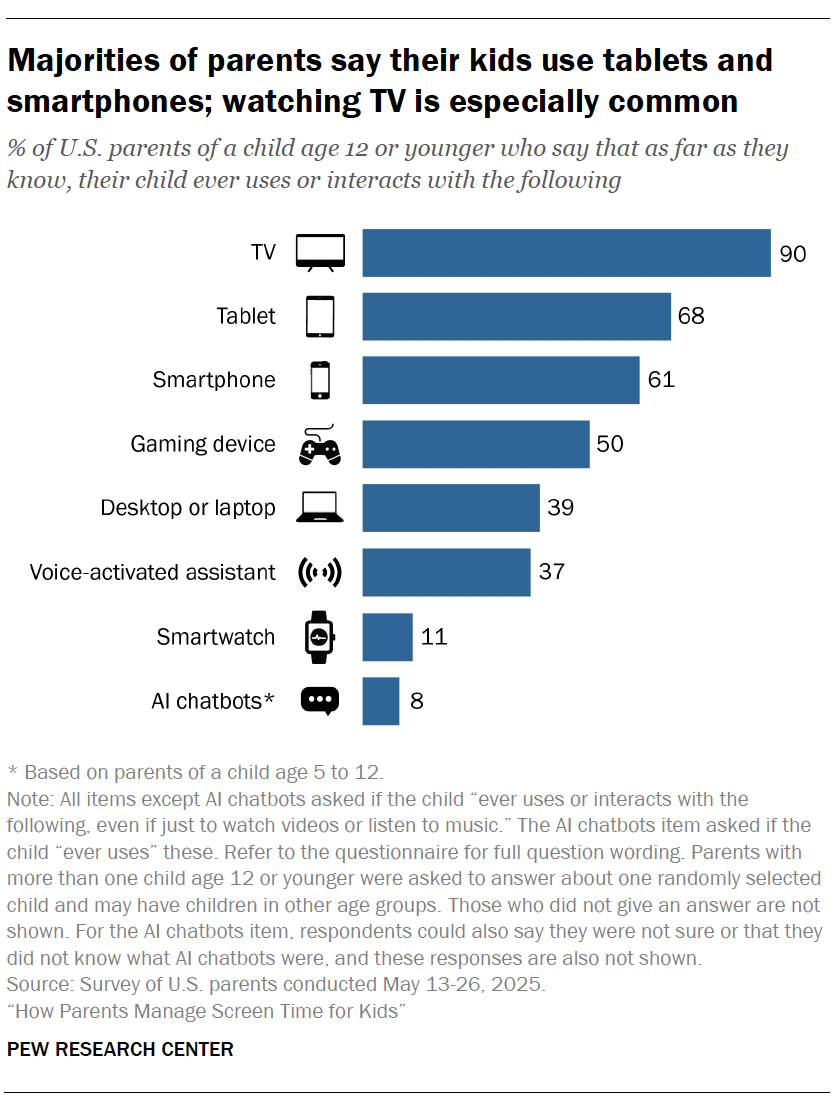
Tablets, smartphones and especially TV stand out in kids’ tech diets:
- Nearly all parents (90%) say their child ever watches television.
- Majorities say their child uses or interacts with a tablet or smartphone.
- Half say the same about gaming devices.
- About four-in-ten each say this about desktops or laptops as well as voice assistants, like Siri or Alexa.
Fewer – 11% of parents – say their child uses a smartwatch.
And among parents with a child age 5 to 12, about one-in-ten say their child uses AI chatbots like ChatGPT or Gemini.
By child age
Parents of older kids are generally more likely to say their child uses devices like smartphones, tablets, gaming devices and desktop or laptop computers. Still, some parents of the youngest kids say their children use these too.
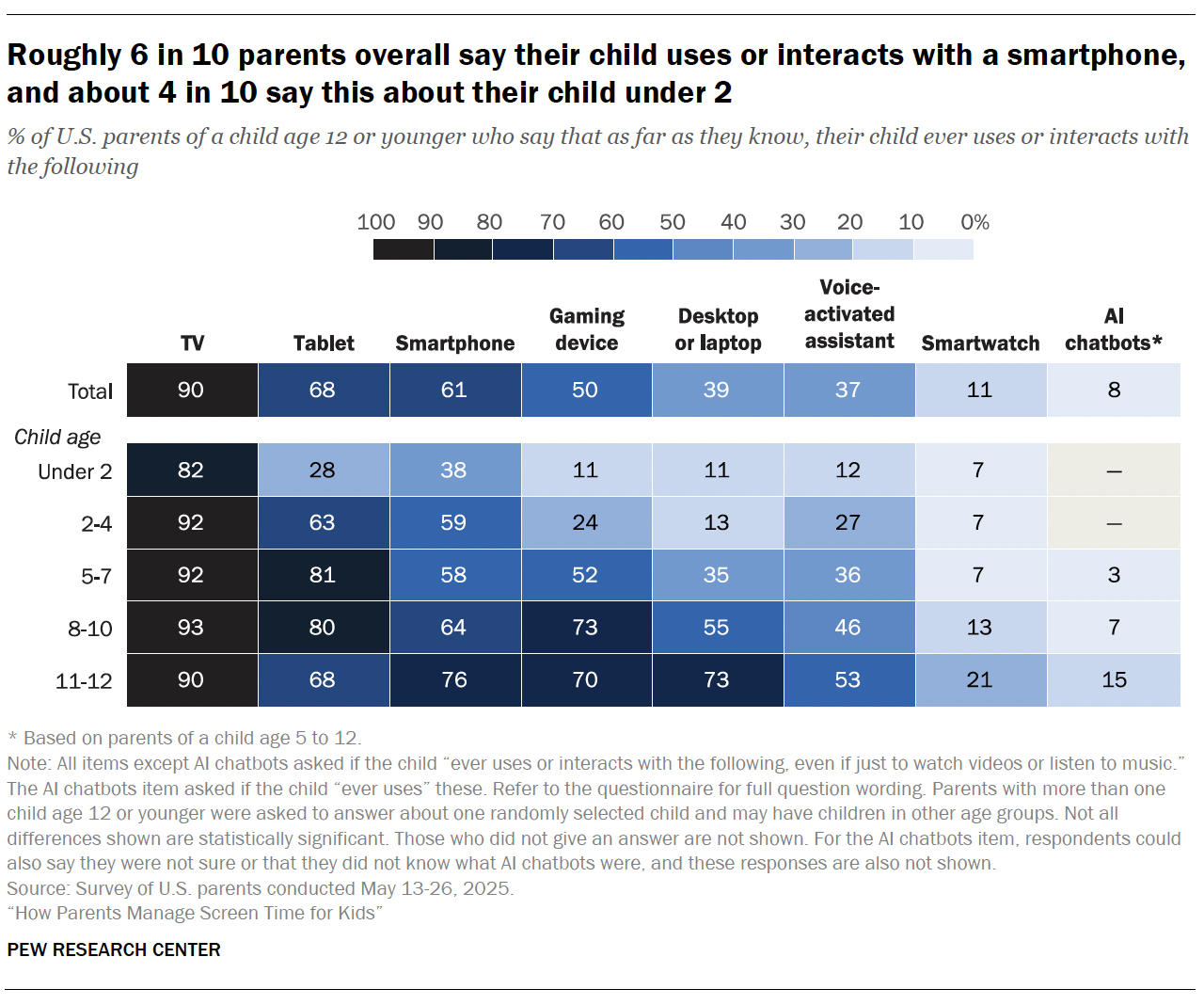
While the vast majority of parents say their child watches TV regardless of age, there’s more variation for some devices, like tablets:
- About three-in-ten parents say their child under 2 uses a tablet.
- This share rises to a majority who say so about their 2- to 4-year-old.
- Larger shares – about eight-in-ten each – say the same about kids ages 5 to 7 and 8 to 10.
- And a slightly smaller share, but still roughly two-thirds, say so about their 11- to 12-year-old.
For smartphones and computers, parents of the oldest kids stand out: About three-quarters say their 11- to 12-year-old uses these devices. Gaming device use also largely rises with child age; about seven-in-ten parents of kids ages 8 to 12 report this.
And while 3% of parents say their 5- to 7-year-old uses AI chatbots, this ticks up to 7% of those with an 8- to 10-year-old and rises further to 15% of parents of an 11- or 12-year-old.
Changes over time
In our 2020 survey, we surveyed parents with a child age 11 or younger on these topics. Then, TV, smartphones and tablets also stood out from other devices that parents said their kids used overall. One place we see change? TV watching for the youngest kids.
Among all parents, this has changed little. About nine-in-ten parents of a child 11 or younger said their child watched TV in 2020, roughly on par with what parents of kids 12 and younger say now.5 But the share of parents who say their child under 2 ever watches TV has risen from 63% to 82%.
We also see a slight dip in desktop or laptop use from 2020, reflecting changes for parents of kids ages 2 to 10, and an uptick in use of gaming devices overall.
Go to the appendix for a full breakdown of device use by age over time.
Do kids have their own smartphones?
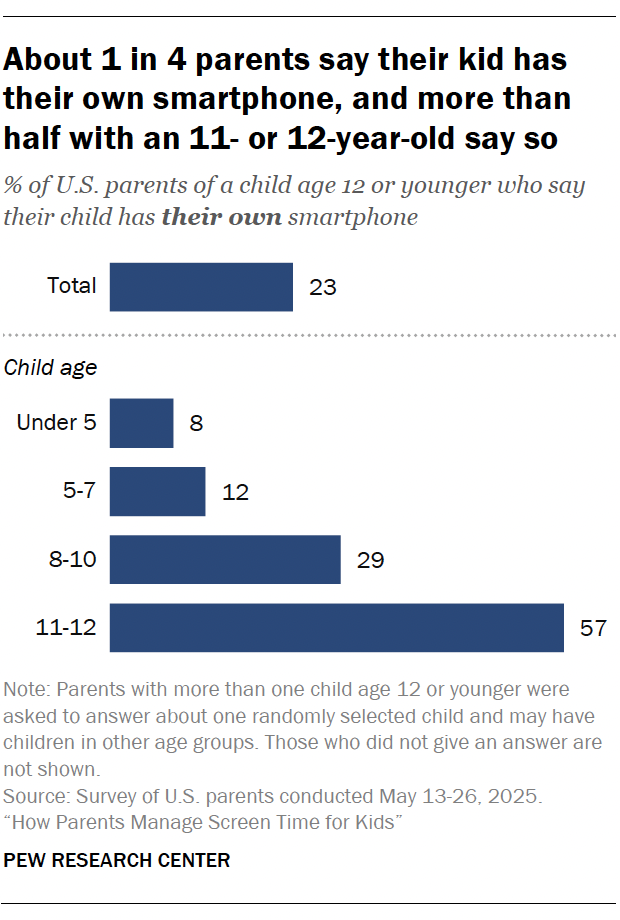
About a quarter of parents with a child age 12 or younger say that their child has their own smartphone (23%).
By child age
Parents of older children are far more likely to say their child has their own smartphone.
About one-in-ten parents (8%) say this about their child under 5, and that ticks up to 12% who say their 5- to 7-year-old has their own smartphone.
A larger share – about three-in-ten – say this about their child age 8 to 10. And that roughly doubles to about six-in-ten who say their child age 11 or 12 has their own smartphone.
By parent race and ethnicity
Black (33%) and Hispanic (30%) parents are more likely than White (20%) and Asian parents (19%) to say their kid has their own smartphone.6
By household income
Parents with lower incomes are most likely to say their child has their own smartphone, at 31%. Smaller shares of those with middle (20%) and upper (16%) incomes say the same.7
When should kids have their own smartphones?
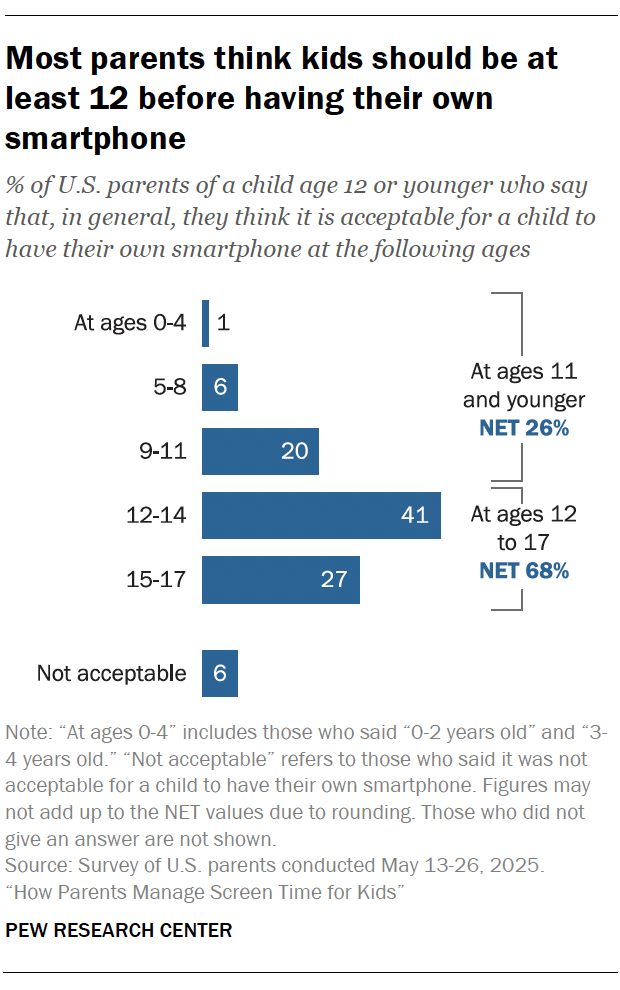
Asked about kids in general, most parents (68%) say children should be at least 12 before having a smartphone of their own.
A smaller share (26%) considers it suitable for kids under 12, while 6% say it’s not acceptable for a child to have their own smartphone.
By parent race and ethnicity
Black parents are most likely to say it’s acceptable before age 12 (44%), followed by Hispanic parents (28%) and then White (22%) and Asian parents (17%).
By household income
Parents in lower-income households are most likely to say owning a smartphone is generally acceptable before age 12 (36%). About one-in-five with middle (21%) or upper incomes (18%) say the same.
Online platforms kids use
YouTube
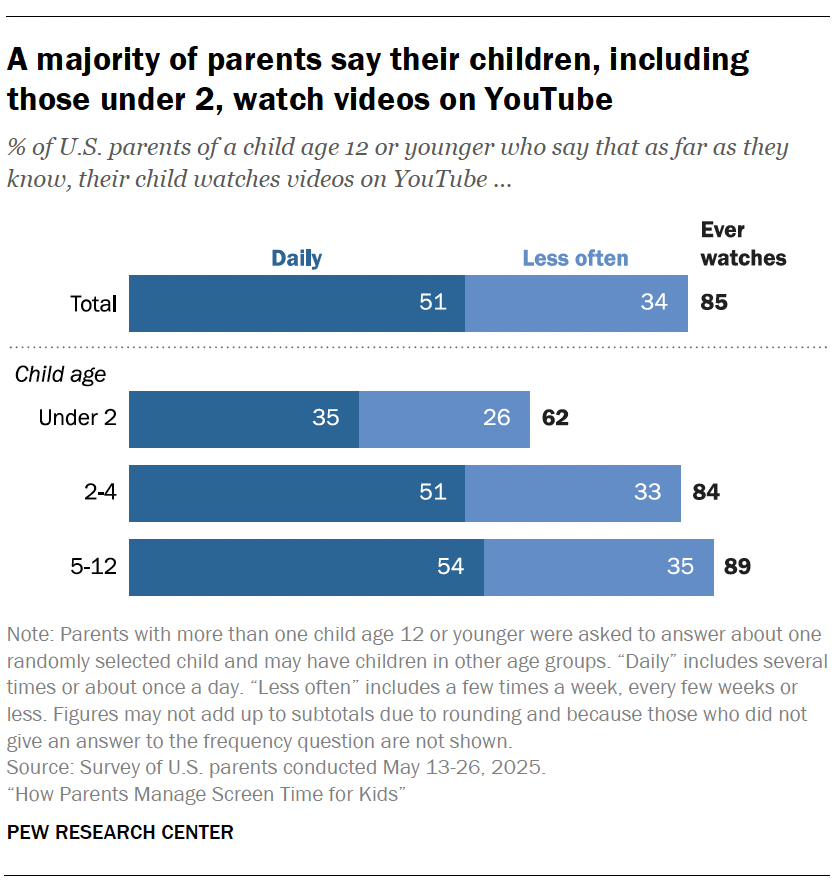
YouTube is a common source of kids’ screen time. Most parents (85%) say their child 12 or younger watches videos on it. And that includes about half who say this happens daily.
By child age
A 62% majority say their child under 2 watches YouTube. This rises to 84% of those with a child age 2 to 4, and to about nine-in-ten of those answering about an older child.
These figures include 35% of parents with a kid under 2 who say that child watches daily. Larger shares say their kid age 2 to 4 (51%) or age 5 to 12 (54%) watches daily.
By household income
Those with lower incomes (55%) and middle incomes (51%) are more likely than those with upper incomes (40%) to say their child watches YouTube daily.
Changes over time
Parents are more likely now than in the past to say their child watches YouTube – and watches it daily.
Overall use ticked up from 80% in 2020, among parents with a child 11 or younger, to 85% of parents with a child 12 or younger today. And daily watching rose from 43% to 51%.8
This largely reflects changes in young kids’ watching habits. In 2020, 45% said their child under 2 ever watched YouTube. Today, that is 62%.
And 35% say their child under 2 watches daily, up from 24%. Daily watching is also up according to parents of children ages 2 to 4 – from 38% to 51% – but stable for other groups.
Are parents watching YouTube with their kids?
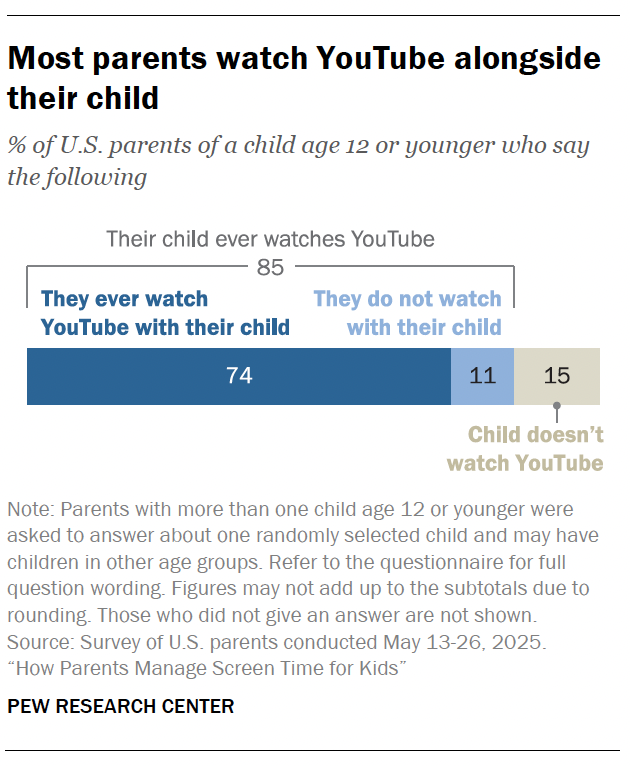
Watching YouTube can be a family affair. In fact, the vast majority of parents say they watch it with their kids who are 12 and under.
About three-quarters of all parents (74%) say they ever watch YouTube together with their child.
By child age
This is a common practice regardless of how old kids are. Looking just at those parents whose kids watch YouTube at all:
- Among parents whose child under 2 watches YouTube, nearly all (95%) say they ever watch it with them.
- Among parents whose 2- to 4-year-old watches, about nine-in-ten parents (93%) say they watch with their child.
- And even among those whose 5- to 12-year-old watches, most parents (84%) say the same.
Social media
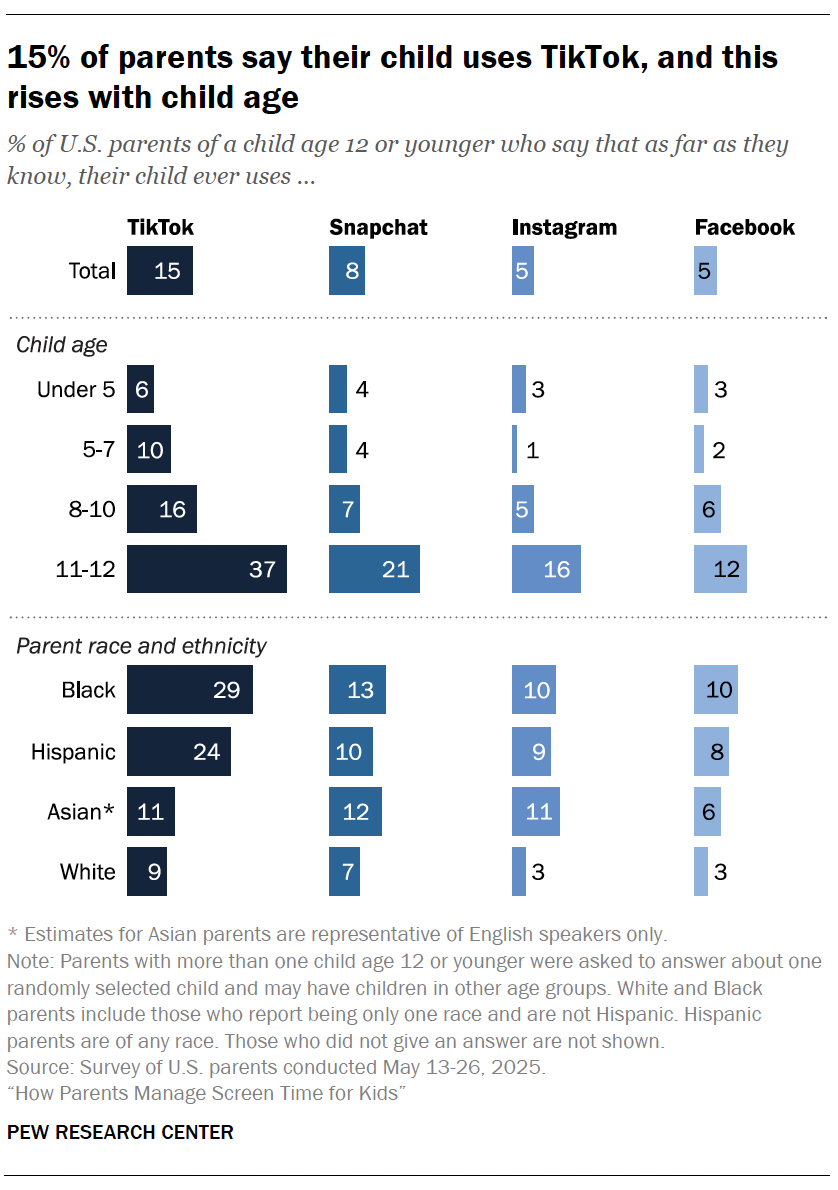
Some 15% of parents say their child uses TikTok. Fewer say their child uses Snapchat (8%), Instagram (5%) or Facebook (5%).
By child age
Parents of the oldest children more commonly say their kids use these platforms.
For example, 37% of parents say their 11- to 12-year-old uses TikTok. That share falls to 16% among parents of a child age 8 to 10, and even further to one-in-ten or fewer among those with a child under 8.
By parent race and ethnicity
Black and Hispanic parents are more likely than White parents to say their child uses some of these platforms.
For example, 29% of Black parents and 24% of Hispanic parents say their child uses TikTok, while about one-in-ten Asian (11%) or White parents (9%) say the same.
Asian parents sometimes stand out from White parents as well. Looking at Instagram, about one-in-ten Asian, Black or Hispanic parents say their child uses the platform, while 3% of White parents say so.
These patterns are similar to those we’ve seen in our work on teens and social media.
Changes over time
Overall, these findings are largely on par with five years ago: Parents with a child 12 or younger are about as likely to say their child uses these platforms, as parents of kids 11 and younger were in 2020. Still, parents’ reports for some older age groups have seen slight declines since then.
Go to the appendix for a full breakdown.
Why parents do – and don’t – let kids use smartphones
Parents’ reasons for letting kids use smartphones
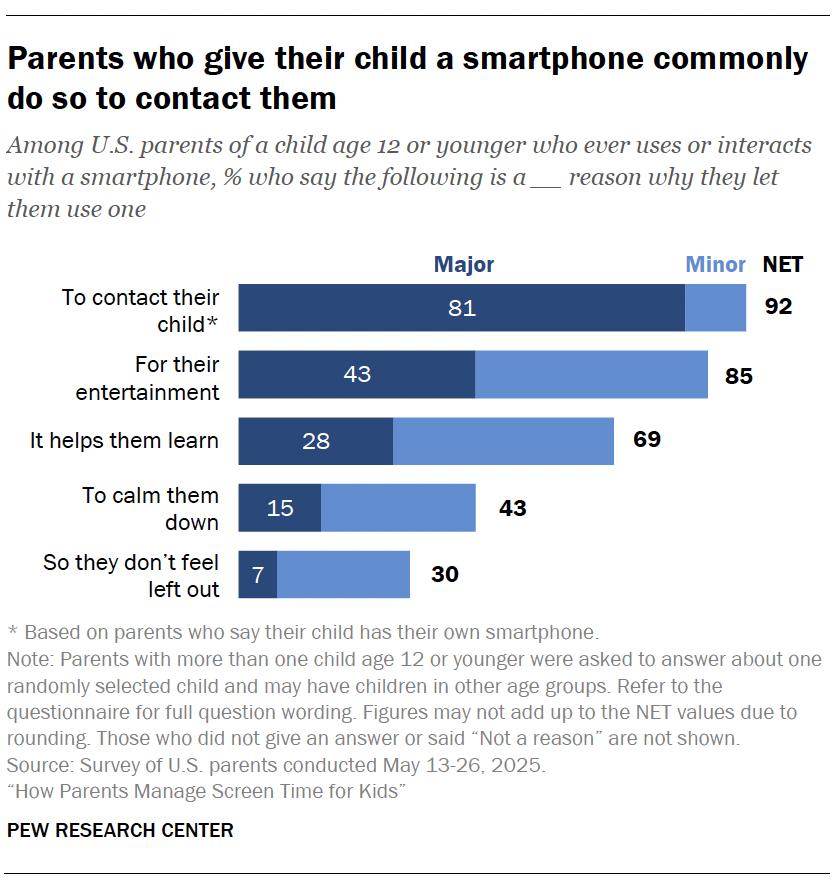
For parents whose child has their own smartphone, a common reason they allow one is to stay in contact. This includes 81% who say this is a major reason they let them use one.
And most parents whose kids use a smartphone at all cite their child’s entertainment as a reason. But a majority of parents also say they allow it because it helps their child learn.
Fewer let their child use smartphones because it calms them down or to prevent them from feeling left out.
By child age
Some reasons vary further by age. For example, 65% of those whose child under 5 uses a smartphone say it’s to calm them down, compared with 34% of parents whose child age 5 to 12 uses one.
By household income
Still among parents with a smartphone-using kid, 74% of those with lower household incomes say they let their child use a smartphone for learning, versus about two-thirds with middle incomes (65%) and 63% with upper incomes.
Those with lower incomes are also more likely to let their child use a smartphone so they don’t feel left out. About four-in-ten (37%) say so, versus about a quarter with middle (27%) or upper incomes (23%).
And 51% with lower incomes say they allow smartphones to calm their kid down, versus smaller shares of their middle- (39%) or upper-income peers (35%).
Parents’ reasons against letting kids use smartphones
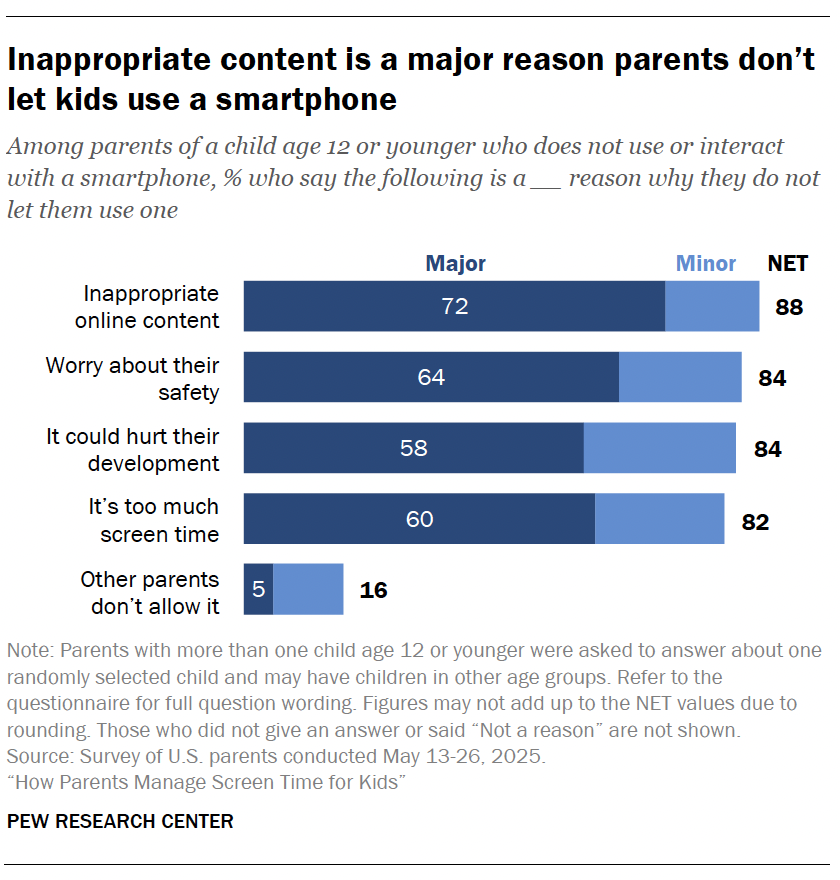
We also asked parents who do not let their child use a smartphone about five reasons why not.
Among these parents, about nine-in-ten say they don’t let their child use a smartphone because their child might see inappropriate things online. This includes 72% who say this is a major reason not to let their child use it, higher than other reasons we asked.
Still, vast majorities of these parents also cite that they are worried about their child’s safety, that it could hurt their development, and that it’s too much screen time.
Far fewer – 16% – point to other parents not allowing it as a reason.
Weighing the harms and benefits of technology
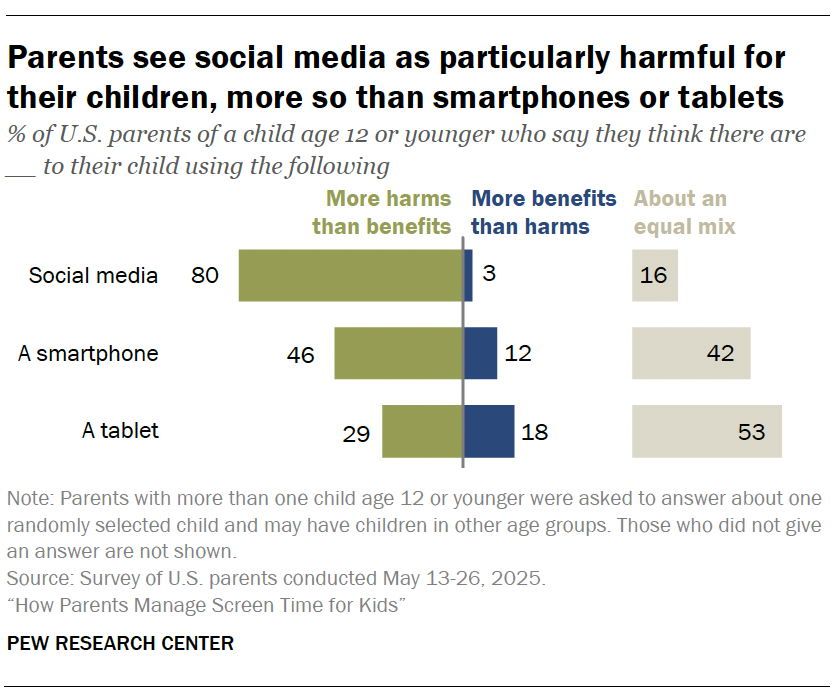
Eight-in-ten parents say the harms of their child using social media outweigh the benefits. Only 3% of parents say the benefits outweigh the harms, while 16% feel there is an equal mix.
They still are more likely to say smartphones’ harms outweigh benefits than the reverse (46% vs. 12%). But 42% say harms and benefits even out.
When it comes to tablets, parents are most likely to say that there’s an equal mix of harms and benefits for their child (53%). Still, more say the harms outweigh benefits (29%) than the reverse (18%).
These trade-offs can be tricky for parents, as we heard in the separate focus groups we conducted in March.
As one parent explained when asked about social media, “You see the psychological effects it can have on kids. … That part is worrying, you know? But … I feel like it’d be hypocritical of me having social media but then my kids can’t. … You just never know what type of influence [social media] will have on them. … You just hope they’re strong enough.”
Another saw educational benefits to phones: “[My daughter] learned to read through one of her apps that I let her download because she has ADHD, and her learning is just different.” Still, that same parent said one worry is “when they’re so zoned in.”
And even educational uses have trade-offs, as another participant described: “I have a 3-year-old, and we don’t let her use a phone or tablet or anything. … I recently let her use my laptop and got … a week’s subscription to an educational platform. It got me thinking there probably are opportunities to use technology as an educational tool … but I’m so scared about the consequences … that I’m probably hesitant to use it at all.”
Are kids spending too much time on screens?
Some parents’ concerns around screen time are not “if” but “how much?”
In the survey, we asked parents about four ways their kids might use screens. For most of them, parents were slightly more likely to say their child spent “too much time” on them compared with “too little time.” For example, 16% of parents say their child spends too much time on a smartphone. Fewer (7%) say their child spends too little time. But larger shares say it’s about the right amount of time (37%) or that their child does not use a smartphone (39%).
Parents’ views on their child’s time using tablets or playing video games follow a similar pattern to smartphones. One-in-five say their child’s tablet time is too much, and 14% say the same of video games. Larger shares say it’s about the right amount.
However, for social media, fairly similar shares of parents say the time their child spends on these sites is too much (5%) or too little (7%). Still, 17% say it’s about right, and many say their child doesn’t use social media.
By child age
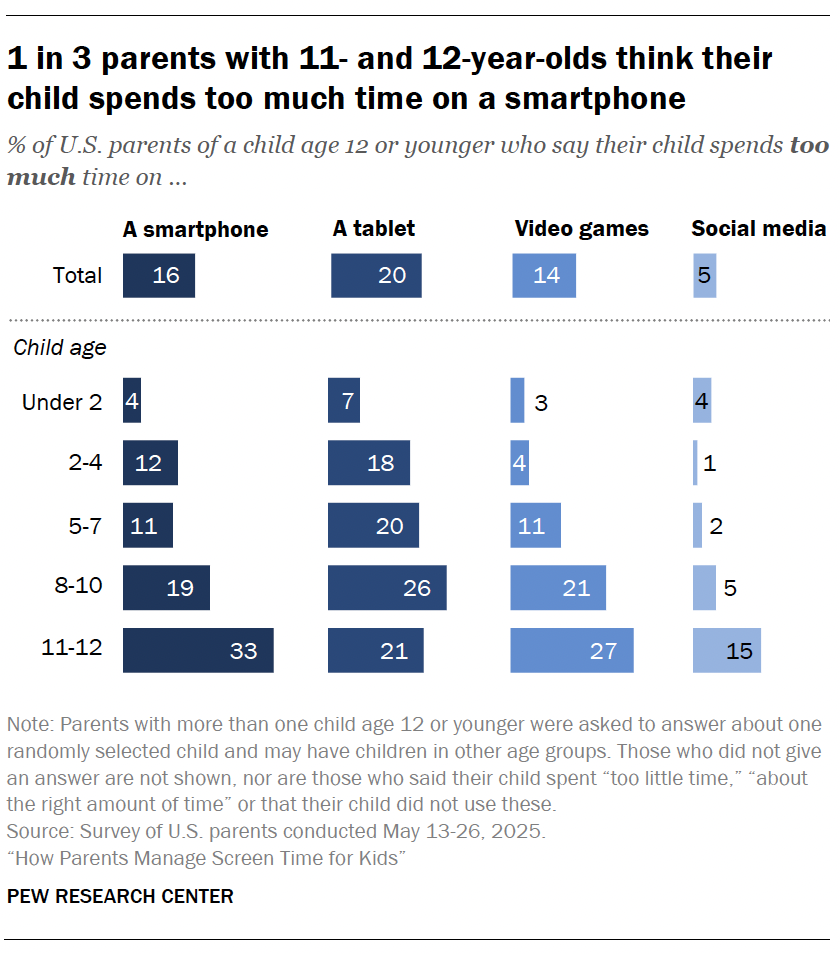
Parents with an 11- or 12-year-old are most likely to say that their child spends too much time on a smartphone or using social media.
A third of parents say their 11- to 12-year-old spends too much time on a smartphone, versus smaller shares of parents of younger children.
Parents of an older child are also more likely to say their kid spends too much time on video games and tablets. Those with 11- to 12-year-olds don’t specifically stand out, though.
Still, 22% say their 5- to 12-year-old spends too much time on a tablet, versus 14% of parents with a child under 5 who say this. There’s a similar pattern for video games (19% vs. 4%).
Parents’ feelings about the amount of screen time kids have
“How much is too much” can prompt complicated feelings for parents today, and in the focus groups we conducted, we heard a few of these considerations.
Asked how they felt about the amount of screen time their kids have, one parent said, “I think an hour is good, or a couple hours throughout the week. … So she’ll come home … maybe [around] 5 to 6 o’clock. She’ll have that liberty to have whatever electronics, watch TV. But … her phone or tablet, they turn that in at 7.”
Another didn’t feel like they had much control, explaining, “I feel like my kids should not be on the internet or anything unless they absolutely have to. But nowadays, I have no choice … she’s in middle school now, and every assignment is online, right?”
And for another, any amount of screen time prompted complicated feelings: “I feel guilty because even if it’s 20, 15 minutes that he’s on his tablet, that’s time we could spend together.”




